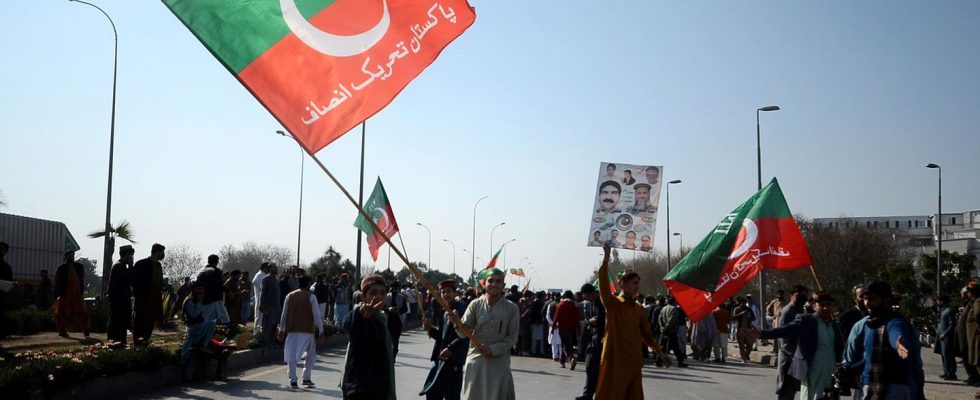Nuclear power
Protests, violence and unclear results: what happens next after the elections in Pakistan?
Supporters of the Pakistan Tehrik-e-Insaf (PTI) party protested against alleged rigging in the parliamentary elections
© Hussain Ali / ZUMA Press Wire / Action Press
Who will lead the nuclear power Pakistan in the future? Counting took place for days after the parliamentary election on Thursday, and the results were marred by violence. In the end, the army could also intervene.
In the election held on Thursday, independent candidates won 101 seats, according to final results. Many of them are connected to Khan’s Pakistan Tehreek-e-Insaf (PTI) party. Because they were excluded from the election, their candidates had to run as independents who were not allowed to form a government.
According to official figures, the Muslim League-Nawaz (PML-N) party, founded by former Prime Minister Nawaz Sharif and supported by the military, won 75 seats, while the Pakistan People’s Party (PPP) won 54 seats. Smaller parties won 34 seats, two remained vacant.
Difficult formation of a government in Pakistan
The PML-N declared itself the party with the most seats. To form a government, however, it will have to talk to rivals and independents. A coalition between the PML-N and the PPP was considered most likely. Both parties had already formed a government after ousting Khan in a no-confidence vote in April 2022.
Leading PTI politicians said they would have won even more seats had it not been for the electoral fraud they denounced. The PTI has received a “mandate from the people” to form the next government. “The people have chosen Imran Khan,” PTI chief Gohar Ali Khan said in an interview.
A nationwide cell phone shutdown on election day and slow counting of results had raised suspicions that the military may have influenced the process in favor of the PML-N. “Elections were subtly manipulated across Pakistan,” the PTI chief said at a press conference. He called on supporters to “peacefully protest.”
Authorities threatened a crackdown, citing a colonial-era law banning public gatherings. “Some people are inciting illegal gatherings around the Election Commission” and other government offices, Islamabad police said, vowing legal action.
Rough and without rules
“Everything is allowed in war and in polo” – at the Shandur Polo Festival in Pakistan, the elite sport returns to its roots
A similar warning was also issued in the city of Rawalpindi, south of the capital. Numerous police officers were deployed in Lahore in the east. AFP reporters observed several small protests by the PTI and other parties across the country that passed without incident. Most of them were attended by no more than a few hundred people.
Former head of government is in prison for high treason
Meanwhile, Pakistan’s military chief Syed Asim Munir called for an end to political polarization. The nation needs “stable hands” to “overcome the politics of anarchy and polarization,” he explained. The military has always played an important role in Pakistan. Generals have ruled the country almost half the time since independence from India in 1947.
The election campaign in Pakistan was marred by violence, the imprisonment of Khan and the obstruction of his PTI party by the military-run establishment. A few days before the election, the popular former head of government and former cricket star was sentenced to long prison terms for treason, bribery and a marriage that was declared illegal.
The day before the election, two deadly bomb attacks were carried out outside the offices of candidates in the southwest of the country, for which the jihadist militia Islamic State (IS) claimed responsibility. Pakistan is the fifth most populous country in the world with 240 million people. The Asian country is in economic crisis.

